Discover Gender: A Wider Lens
Gender: A Wider Lens

Gender: A Wider Lens
Author: Sasha Ayad and Stella O'Malley
Subscribed: 520Played: 35,917Subscribe
Share
© Stella O'Malley & Sasha Ayad
Description
In this podcast, now in its fourth year, therapists Stella O'Malley and Sasha Ayad take a deep dive into the psychological and cultural forces impacting the social changes around "gender." Through interviews with researchers, doctors, therapists, parents, detransitioners, and others, Sasha and Stella's podcast is a "must listen" for anyone trying to navigate the current gender landscape. With their sharp analytical minds and deep compassionate hearts, Stella and Sasha have also become known throughout many parent networks as lighthouses in the midst of some very stormy seas. Previous guests include Helen Joyce, Jesse Singal, Leor Sapir, Kathleen Stock, Jamie Reed, Peter Boghossian and more.
www.widerlenspod.com
www.widerlenspod.com
353 Episodes
Reverse
Stella O’Malley and Sasha Ayad are two therapists interested in how the concept of gender is impacting our culture and shaping our society. For nearly a decade, we've been exploring sex and gender and helping patients and families impacted by gender issues. As we've dug into the shifting concepts of identity, gender, and transition, we felt unsatisfied by clichés, mental health platitudes, and modern gender jargon.Have you ever thought there's got to be more to all this trans stuff than political slogans? Well, we're right there with you. Since 2020, on our podcast, Gender: A Wider Lens, we've discussed all things trans with brilliant guests, including academic philosophers, journalists, doctors, therapists, trans people, detrans people, parents, and many others. In hundreds of conversations, we've tried to hold a spirit of honesty and compassion while staying grounded in reality and sanity.After four years of creating this podcast, we're shifting gears into our Substack only Live and Unfiltered events. Once a month, you can now join us on Substack for discussions about current events in the gender world and analysis of your favorite episodes of Gender: A Wider Lens. Grab your coffee or cocktail and hang out with us in our new live and unrecorded private sessions.Don't worry, our entire huge archive of episodes isn't going anywhere. You can still find us on all major podcast platforms, and you can watch us on YouTube and look at helpful playlists that organize past episodes so you can find exactly what you're looking for. But our main hub continues to be Substack, where you can listen to four years’ worth of free episodes, or become a paid subscriber to join our new monthly, Live and Unfiltered events.Our paid Substack membership is also the only place to access over 100 premium episodes featuring answers to listener questions and bonus content with our guests. We'd love for you to come and say hi, drop us a question, or tell us what episodes you'd like us to analyze. So join us on Substack. As we look at gender, from a wider lens. This is a public episode. If you would like to discuss this with other subscribers or get access to bonus episodes, visit www.widerlenspod.com
Sasha and Stella come together for the finale episode of Gender: a Wider Lens, reflecting on four years of sharing conversations, psychological analysis, and interviews centered around the exploration of gender identity, the evolving cultural landscape, and the trans discourse. Together, they have produced over 200 episodes providing informative insights and practical approaches for listeners, whether they have loved ones questioning their gender, are professionals encountering or supporting gender-questioning youth, or individuals grappling with their own gender identity.In this final conversation, Sasha and Stella reflect on some of their most memorable episodes and pivotal discussions, marking significant progressions in the evolving understanding of identity development and gender transition. They also share details about each of their new resources in development, as well as the new live and unfiltered sessions they will be hosting each month together.It's been a remarkable progression - from early observations of unusual patterns with gender-questioning teens inspiring the opening episode of the show exploring identity vs. dysphoria, to interviews with professional pioneers in gender medicine, to conversations with parents, trans individuals, school professionals, clinicians, journalists, authors, researchers, doctors, lawyers, politicians, activists, whistleblowers, spouses of trans people, children of trans people, and a growing list of detransitioners each with their own unique story and insights - a wide lens of different perspectives, offering reflections on gender and the shifting public consciousness around social and medical transition.For links to resources featured in this episode, there's more to explore, access the full show notes at https://www.widerlenspod.com/p/episode-205 Buy Our Book – When Kids Say They’re Trans: A Guide for Thoughtful Parents at https://whenkidssaytheyretrans.com/ Join Our Listener Community to Access Exclusive Content at https://www.widerlenspod.com/ Support the Show at https://www.widerlenspod.com/p/support-the-show Join the conversation on YouTube at www.youtube.com/@widerlenspod For more information about Sasha’s & Stella’s parent coaching membership groups, visit:Sasha Ayad: https://sashaayad.com/parenting-coaching Stella O’Malley: http://www.stellaomalley.com/parent-coaching This is a public episode. If you’d like to discuss this with other subscribers or get access to bonus episodes, visit www.widerlenspod.com/subscribe This is a public episode. If you would like to discuss this with other subscribers or get access to bonus episodes, visit www.widerlenspod.com
While healthcare is expected to be guided by evidence-based practice and individualized patient care, there seems to be a growing perception that some medical professionals may be more focused on advancing ideological influence rather than prioritizing individualized patient care.The gender-affirming model of care functions as a streamlined path toward medical transition, often without sufficient psychological evaluation or exploration of alternatives. Many medical providers appear to follow a predetermined course rather than carefully assessing each patient’s unique circumstances. This raises serious ethical concerns about whether patients—particularly minors—are receiving the thorough, cautious care they deserve.Additionally, the reluctance to critically discuss or debate aspects of gender medicine suggests that the field has become entangled with broader political movements. In some cases, dissenting voices, including those of detransitioners, have struggled to be heard, as their experiences challenge dominant narratives about gender-affirming care.“It's sad that so many more parents I feel would speak out if it weren't so stigmatized to question anything related to child transition. And it makes me really sad because I know my parents have a lot they wish they could say and they just can't. And even if they did, they would be attacked and called liars, which is really sad to me.”In this bonus episode for premium subscribers, Clementine discusses the societal and medical influences that shaped her transition, expressing concern about the growing politicization of gender medicine. While she supports the right of adults to pursue body modifications, she argues that irreversible procedures affecting bodily function should be limited to those who are fully mature and capable of making such significant decisions. She describes how stopping testosterone significantly improved her mental health, suggesting a link between high testosterone levels and psychosis in women. And she reflects on the role her family and partner played in her detransition, highlighting the importance of having someone who saw her as a person beyond identity labels.Watch our full length episode with Clementine Breen: https://www.widerlenspod.com/p/episode-204For instructions on setting up a private feed to listen to our premium content in your favorite podcast app, visit https://www.widerlenspod.com/p/how-to-listen-to-our-full-premium. This is a public episode. If you would like to discuss this with other subscribers or get access to bonus episodes, visit www.widerlenspod.com
Looking for support as a parent of a gender-questioning youth or young adult? Attend a Wider Lens Parent Retreat in 2025! Registration is now open. Visit https://widerlens.events/parent-retreat-2025 to learn more and secure your spot.Sasha and Stella welcome Clementine Breen, a 20-year-old young woman who detransitioned after undergoing rapid medicalization as a child. Clementine was a patient of Dr. Johanna Olson-Kennedy, one of the most prominent advocates for pediatric gender medicine. Beginning at age 12, she was placed on puberty blockers, prescribed testosterone, and underwent a double mastectomy—all by the age of 14.In this episode, she shares her story, shedding light on the devastating consequences of fast-tracked gender-affirming care. Clementine discusses how following her surgery, she experienced severe mental health struggles, including dissociation, self-harm, and a suicide attempt, yet clinicians remained focused solely on continuing her transition despite her worsening mental status. Clementine shares how, years later, proper therapy allowed her to uncover deeper psychological and childhood issues, exposing the failure of superficial gender-affirming care to address underlying trauma.This conversation exposes the dangerous flaws in the gender medicine model and the lack of psychological evaluation for vulnerable youth. Clementine’s experience underscores the failures of the pediatric gender medical establishment, and the urgent need for accountability in a system that prioritizes affirmation over comprehensive care.For links and resources relevant to this episode, access the full show notes at https://www.widerlenspod.com/p/episode-204 Buy Our Book – When Kids Say They’re Trans: A Guide for Thoughtful Parents at https://whenkidssaytheyretrans.com/ Join Our Listener Community to Access Exclusive Content at https://www.widerlenspod.com/ Support the Show at https://www.widerlenspod.com/p/support-the-show Join the conversation on YouTube at www.youtube.com/@widerlenspod For more information about Sasha’s & Stella’s parent coaching membership groups, visit:Sasha Ayad: https://sashaayad.com/parenting-coaching Stella O’Malley: http://www.stellaomalley.com/parent-coaching To learn more about our sponsors, visit:Therapy First at https://www.therapyfirst.org/ Genspect at https://genspect.org/ This is a public episode. If you’d like to discuss this with other subscribers or get access to bonus episodes, visit www.widerlenspod.com/subscribe This is a public episode. If you would like to discuss this with other subscribers or get access to bonus episodes, visit www.widerlenspod.com
The DSM diagnostic criteria for gender dysphoria are rooted in outdated sex-based stereotypes, reinforcing rigid and superficial notions of what it means to be male or female. These criteria often emphasize preferences in clothing, activities, and playmates, implying that natural variations in a child’s behavior may signal a fundamental misalignment between their gender identity and biological sex.Historically, gender nonconformity in children was recognized as a common and unremarkable aspect of personality and development. However, cultural shifts and the rise of social media have amplified stereotypes, leading many to pathologize behaviors that once fell within the broad spectrum of normal childhood expression. A boy who enjoys dolls or a girl who prefers rough-and-tumble play is now more likely than ever to be viewed through a diagnostic lens that suggests “misalignment with their sex” rather than an expansion of what it means to be a boy or a girl.In this bonus episode for premium subscribers, Dr. Marieke den Ouden examines how the DSM’s shift from “sex” to “gender” has introduced diagnostic ambiguity, increasing the risk of over-diagnosing children based on nonconformity to traditional gender roles. Highlighting inconsistencies across international definitions, she warns of the legal and policy ramifications of vague gender identity standards, particularly for women’s rights and medical ethics. She presents a critical yet measured perspective, calling for greater clarity and scientific integrity. She advocates for a re-evaluation of gender dysphoria diagnosis to ensure that criteria are based on objective, measurable factors rather than social perceptions of gender roles, ensuring that medical and psychological interventions serve those in genuine need without unnecessarily pathologizing diverse expressions of personality and identity.Watch our full length episode with Marieke den Ouden: https://www.widerlenspod.com/p/episode-203For instructions on setting up a private feed to listen to our premium content in your favorite podcast app, visit https://www.widerlenspod.com/p/how-to-listen-to-our-full-premium. This is a public episode. If you would like to discuss this with other subscribers or get access to bonus episodes, visit www.widerlenspod.com
Sasha and Stella welcome Dr. Marieke den Ouden, a medical biologist and psychologist, about pediatric gender medicine in the Netherlands. While the Dutch Protocol is believed to ensure thorough mental health evaluations, Marieke reveals inconsistencies in its application. She discusses a new survey gathering input from extended family on a child’s mental health and gender identity, raising questions about bias in reporting. The conversation also explores the clinical foundations of gender medicine, examining how early researchers with backgrounds in disorders of sexual development (DSDs) shaped the field. Their search for a biological basis of gender identity—whether in hormones, chromosomes, or brain structures—led to a medicalized approach to gender distress. This framing has contributed to the widespread push for medical interventions, fast-tracking youth into irreversible treatments despite a lack of clear biological justification.This episode presents fresh debates and critical insights into the ethical dilemmas surrounding pediatric gender transition and the protocols involved.For links and resources relevant to this episode, access the full show notes at https://www.widerlenspod.com/p/episode-203 Buy Our Book – When Kids Say They’re Trans: A Guide for Thoughtful Parents at https://whenkidssaytheyretrans.com/ Join Our Listener Community to Access Exclusive Content at https://www.widerlenspod.com/ Support the Show at https://www.widerlenspod.com/p/support-the-show Join the conversation on YouTube at www.youtube.com/@widerlenspod For more information about Sasha’s & Stella’s parent coaching membership groups, visit:Sasha Ayad: https://sashaayad.com/parenting-coaching Stella O’Malley: http://www.stellaomalley.com/parent-coaching To learn more about our sponsors, visit:Therapy First at https://www.therapyfirst.org/ Genspect at https://genspect.org/ This is a public episode. If you’d like to discuss this with other subscribers or get access to bonus episodes, visit www.widerlenspod.com/subscribe This is a public episode. If you would like to discuss this with other subscribers or get access to bonus episodes, visit www.widerlenspod.com
As societal perceptions of gender identity continue to evolve, the conversation around gender dysphoria has grown increasingly complex and polarized, particularly in recent years. This has sparked critical questions about the underlying causes of gender identity confusion, the role of medical interventions, and the broader cultural implications. Exploring these topics requires a careful balance of scientific inquiry, ethical considerations, and an openness to the diverse experiences of those affected.As public discourse has become more contentious, the space for nuanced discussions about the complexities of transgender identities has narrowed. This polarization often reduces the conversation to simplistic binaries of affirmation versus denial, leaving little room to explore the diverse experiences and motivations that shape individuals’ journeys.The concept of being "trans" has undergone a significant transformation. Today, the term encompasses a wider array of experiences than those represented in the “T” category of the LGBT culture of yesteryear. Nonbinary identities, the rainbow alphabet, and the many expressions of gender that do not involve dysphoria are being amplified by the influence of the algorithm, potentially influencing individuals to adopt identities that may not reflect deeper, intrinsic realities.The increase in minors identifying as transgender has brought these dynamics into sharper focus. A significant rise in the number of young people, particularly adolescent girls, identifying as trans has prompted questions about the underlying causes. Trauma, social pressures, and identity exploration have all been suggested as factors contributing to the “trans” trend. And while the broadened definition of “trans” has fostered a growing societal acceptance of diverse gender expressions, some argue that this fluidity has diluted the term itself, making it harder to discern the underlying motivations or needs of those who identify as transgender.In this bonus episode for premium subscribers, Jessi critiques the political and social trends influencing youth, particularly the notion that being transgender is seen as "cool" or "edgy." She emphasizes the irreversible consequences of transitioning, particularly for those under 25, whom she believes lack the maturity to make such significant decisions. She also highlights how societal stereotypes about gender roles impact both men and women. She points out that rigid expectations, such as "big boys don't cry," contribute to gender identity struggles and may lead some young men to identify as transgender as a way to escape these pressures.Watch our full length episode with Jessi: https://www.widerlenspod.com/p/episode-202For instructions on setting up a private feed to listen to our premium content in your favorite podcast app, visit https://www.widerlenspod.com/p/how-to-listen-to-our-full-premium. This is a public episode. If you would like to discuss this with other subscribers or get access to bonus episodes, visit www.widerlenspod.com
Sasha and Stella welcome Jessi, a 69-year-old detransitioned butch lesbian, who shares her extraordinary life story. Jessi’s journey challenges misconceptions about detransitioners, confronting the common assumption that they are predominantly young people who transitioned in adolescence. Instead, her experiences shine a light on older individuals who made these life-altering decisions in vastly different cultural and social contexts. Her life as a gay rights advocate, shaped by threats and hardships, reveals the complexities behind her decision to transition during a time when living openly as a gender non-conforming lesbian carried significant risks.This episode offers a compelling exploration of the varied paths of detransitioners, and provides a thoughtful reflection on the broader social and psychological complexities of navigating life outside traditional gender norms.For links and resources relevant to this episode, access the full show notes at https://www.widerlenspod.com/p/episode-202.Buy Our Book – When Kids Say They’re Trans: A Guide for Thoughtful Parents at https://whenkidssaytheyretrans.com/ Join Our Listener Community to Access Exclusive Content at https://www.widerlenspod.com/ Support the Show at https://www.widerlenspod.com/p/support-the-show Join the conversation on YouTube at www.youtube.com/@widerlenspod For more information about Sasha’s & Stella’s parent coaching membership groups, visit:Sasha Ayad: https://sashaayad.com/parenting-coaching Stella O’Malley: http://www.stellaomalley.com/parent-coaching To learn more about our sponsors, visit:Therapy First at https://www.therapyfirst.org/ Genspect at https://genspect.org/ This is a public episode. If you’d like to discuss this with other subscribers or get access to bonus episodes, visit www.widerlenspod.com/subscribe This is a public episode. If you would like to discuss this with other subscribers or get access to bonus episodes, visit www.widerlenspod.com
In this episode, former Democratic State Representative Shawn Thierry reflects on her role in advocating for Texas Senate Bill 14 (TX SB14), which raised the minimum age for gender transition procedures to 18. Despite sharing concerns about the medicalization of minors with her fellow Democratic colleagues, Shawn was warned that her seat would be at stake for going on the record with her position and voting in favor of the bill. Her steadfast commitment to integrity led her to take a stand, even though it ultimately cost her re-election. Shawn discusses the two-year research process that shaped her decision, the personal risks she faced, and the pressures she encountered from within her own party. Throughout the conversation, she highlights the importance of principled leadership, unwavering dedication to doing what is right, and standing firm in the face of political and social pressures.For links and resources relevant to this episode, access the full show notes at https://www.widerlenspod.com/p/episode-201 Buy Our Book – When Kids Say They’re Trans: A Guide for Thoughtful Parents at https://whenkidssaytheyretrans.com/ Join Our Listener Community to Access Exclusive Content at https://www.widerlenspod.com/ Support the Show at https://www.widerlenspod.com/p/support-the-show Join the conversation on YouTube at www.youtube.com/@widerlenspod For more information about Sasha’s & Stella’s parent coaching membership groups, visit:Sasha Ayad: https://sashaayad.com/parenting-coaching Stella O’Malley: http://www.stellaomalley.com/parent-coaching To learn more about our sponsors, visit:Therapy First at https://www.therapyfirst.org/ Genspect at https://genspect.org/ This is a public episode. If you’d like to discuss this with other subscribers or get access to bonus episodes, visit www.widerlenspod.com/subscribe This is a public episode. If you would like to discuss this with other subscribers or get access to bonus episodes, visit www.widerlenspod.com
The emotional and mental toll of navigating a child’s struggles with gender dysphoria can be profound. Parents often confront feelings of helplessness, confusion, and even grief as they face the rapid progression of medical interventions or societal pressures that seem at odds with their instincts or values. This journey is undeniably challenging, but it’s crucial for parents to prioritize their own emotional well-being in order to provide the steady, loving support their children need.Self-care is not a selfish act; it is a necessary foundation for maintaining the strength and clarity required to guide and advocate for a child in such a complex, personal struggle. Amid overwhelming challenges, it’s easy to feel isolated. However, it’s important to remember that no parent is alone. Building a network of like-minded individuals, seeking professional support, and tapping into community resources offers not only practical advice but also emotional sustenance, providing the reassurance and solidarity needed to persevere. In this bonus episode for premium subscribers, Lydia emphasizes the need for a balance of compassion and boundaries, encouraging parents to listen attentively to their child's experiences and feelings while maintaining a clear sense of their role as guides and advocates. She highlights the importance of hope and connection and underscores the value of fostering open communication within the family.Watch our full length episode with Lydia: https://www.widerlenspod.com/p/episode-200For instructions on setting up a private feed to listen to our premium content in your favorite podcast app, visit https://www.widerlenspod.com/p/how-to-listen-to-our-full-premium. This is a public episode. If you would like to discuss this with other subscribers or get access to bonus episodes, visit www.widerlenspod.com
Looking for support as a parent of a gender-questioning youth or young adult? Attend a Wider Lens Parent Retreat in 2025! Registration is now open. Visit https://widerlens.events/parent-retreat-2025 to learn more and secure your spot.Sasha and Stella welcome mother and advocate, Lydia, to the show for an insightful discussion about the emotional and relational dynamics impacting boys experiencing gender dysphoria. They reflect on the critical work of ROGDBoys.org, a website dedicated to raising awareness and providing vital information about the impact of medical interventions on boys and men with gender identity confusion.Many families face distinct challenges rooted in the intersection of social expectations, emotional needs, and emerging gender identity beliefs. Boys, unlike their female counterparts, often struggle with expressing vulnerability or gentleness, leading some to seek alternative paths to connection, such as through gender identity beliefs. For many deeply sensitive boys, adopting a female identity offers them access to intimacy and belonging, particularly within female friend groups, where tenderness and acceptance are more easily found.In this episode, Lydia reflects on her family’s experiences around her son’s ROGD and how her own upbringing in a high-control religious environment shaped her understanding of the complex control tactics at play. She shares insights into the profile of boys drawn to gender identity beliefs, often marked by intelligence, black-and-white thinking, and an affinity for structured systems. Lydia emphasizes the dissonance between scientific reasoning and oversimplified views of gender transformation, revealing how cultural narratives amplify this confusion. She also highlights the nuanced complexities of sexuality and identity, and cautions against reducing AGP to a simplistic conclusion, framing it instead as a complex experience rooted in integration and shame. Finally, she stresses the importance of recognizing the diversity of families affected by gender dysphoria and challenges the misconception that parenting style alone dictates a child’s experiences and outcomes.For links and resources relevant to this episode, access the full show notes at https://www.widerlenspod.com/p/episode-200 Buy Our Book – When Kids Say They’re Trans: A Guide for Thoughtful Parents at https://whenkidssaytheyretrans.com/ Join Our Listener Community to Access Exclusive Content at https://www.widerlenspod.com/ Support the Show at https://www.widerlenspod.com/p/support-the-show Join the conversation on YouTube at www.youtube.com/@widerlenspod For more information about Sasha’s & Stella’s parent coaching membership groups, visit:Sasha Ayad: https://sashaayad.com/parenting-coaching Stella O’Malley: http://www.stellaomalley.com/parent-coaching To learn more about our sponsors, visit:Therapy First at https://www.therapyfirst.org/ Genspect at https://genspect.org/ This is a public episode. If you’d like to discuss this with other subscribers or get access to bonus episodes, visit www.widerlenspod.com/subscribe This is a public episode. If you would like to discuss this with other subscribers or get access to bonus episodes, visit www.widerlenspod.com
Over the last few decades, the rapid rise of secularism, alongside the dissolution of traditional institutions, has left many feeling disconnected from deeper sources of meaning and purpose. This void has led to the emergence of new ideologies and movements that seek to provide meaning where religious traditions once did. From the rise of trans activism to the increasing influence of secular humanism, these new belief systems are born from the intellectual vacuum left behind by the decline of faith in established religious structures. At the heart of this cultural shift lies the struggle to reconcile the material world with the deeper, intangible needs of the human soul. The material world, with its focus on immediate gratification, wealth, and success, offers little in the way of lasting fulfillment. In a society that increasingly values individualism and material success, questions of spiritual fulfillment and moral discernment often go unaddressed, contributing to a growing sense of confusion, anxiety, and fragmentation. In a society where secular ideologies promise individual empowerment but often fail to address the complexities of human existence, faith-based frameworks may provide a meaningful path to address the deeper, non-material needs of spiritual well-being, which contemporary ideological frameworks tend to neglect. Religious practice can serve as an anchor, helping people navigate the uncertainties of modern life with greater resilience, compassion, and a deeper connection to universal truths such as justice, kindness, and community—principles that have sustained human civilization and fostered cohesion across cultures for millennia.In this bonus episode for premium subscribers, Winston Marshall explores the transformative power of faith in overcoming personal struggles, noting a cultural revival of Christianity in intellectual circles as a response to the void left by atheism and the rise of ideologies like trans activism. He advocates for the enduring relevance of Christian principles (such as truth, resilience, and faith) along with values shared across mainstream religions emphasizing that there is something greater than the material world, especially in a society increasingly divided on social, cultural, and political issues.Watch our full length episode with Winston Marshall: https://www.widerlenspod.com/p/episode-199For instructions on setting up a private feed to listen to our premium content in your favorite podcast app, visit https://www.widerlenspod.com/p/how-to-listen-to-our-full-premium. This is a public episode. If you would like to discuss this with other subscribers or get access to bonus episodes, visit www.widerlenspod.com
This conversation was recorded prior to the U.S. presidential election. Any references to the election or its potential outcomes reflect the perspectives and context at the time of recording.Stella and Sasha welcome Winston Marshall, former banjoist for Mumford & Sons, to discuss the personal and professional fallout following his tweet about Andy Ngo's book Unmasked. He opens up about navigating censorship, conformity, and the immense power of social media in shaping public discourse. Winston reflects on the pressure artists face when balancing personal beliefs with industry expectations, and how political events influence cultural movements.In this conversation, Winston shares his experience being thrust into an online firestorm and the deeply personal decision to step away from the band he cherished for over a decade. His choice emerges as an act of integrity, demonstrating the courage it takes to embrace authenticity and stand against the tide of groupthink.For links and resources relevant to this episode, access the full show notes at https://www.widerlenspod.com/p/episode-199 Buy Our Book – When Kids Say They’re Trans: A Guide for Thoughtful Parents at https://whenkidssaytheyretrans.com/ Join Our Listener Community to Access Exclusive Content at https://www.widerlenspod.com/ Support the Show at https://www.widerlenspod.com/p/support-the-show Join the conversation on YouTube at www.youtube.com/@widerlenspod For more information about Sasha’s & Stella’s parent coaching membership groups, visit:Sasha Ayad: https://sashaayad.com/parenting-coaching Stella O’Malley: http://www.stellaomalley.com/parent-coaching To learn more about our sponsors, visit:Therapy First at https://www.therapyfirst.org/ Genspect at https://genspect.org/ This is a public episode. If you’d like to discuss this with other subscribers or get access to bonus episodes, visit www.widerlenspod.com/subscribe This is a public episode. If you would like to discuss this with other subscribers or get access to bonus episodes, visit www.widerlenspod.com
In this special episode, Sasha and Stella pass the mic to honorary guest host, journalist, author, and feminist campaigner, Helen Joyce, who interviews Marian Tompson, in connection with Joyce’s recent article about Marian in The Times, "Why I Quit the Breastfeeding Charity I Founded Over Trans Ideology".Marian Tompson, along with six other mothers, founded the global breastfeeding support network, La Leche League, in 1956. In November 2024, Tompson resigned from both the organization and its Board of Directors, believing it had strayed from its original mission to support biological mothers in breastfeeding.Helen’s conversation with Marian touches on the physiological intricacies of breastfeeding, the historical challenges women faced to maintain breastfeeding practices, and the broader implications of integrating transgender individuals into traditionally female-centered spaces like La Leche League. Together, they share a candid discussion exploring how biological realities, societal shifts, and ideological debates converge in today’s discourse on gender, motherhood, and breastfeeding.For links and resources relevant to this episode, access the full show notes at https://www.widerlenspod.com/p/episode-198 Buy Our Book – When Kids Say They’re Trans: A Guide for Thoughtful Parents at https://whenkidssaytheyretrans.com/ Join Our Listener Community to Access Exclusive Content at https://www.widerlenspod.com/ Support the Show at https://www.widerlenspod.com/p/support-the-show Join the conversation on YouTube at www.youtube.com/@widerlenspod For more information about Sasha’s & Stella’s parent coaching membership groups, visit:Sasha Ayad: https://sashaayad.com/parenting-coaching Stella O’Malley: http://www.stellaomalley.com/parent-coaching To learn more about our sponsors, visit:Therapy First at https://www.therapyfirst.org/ Genspect at https://genspect.org/ This is a public episode. If you’d like to discuss this with other subscribers or get access to bonus episodes, visit www.widerlenspod.com/subscribe This is a public episode. If you would like to discuss this with other subscribers or get access to bonus episodes, visit www.widerlenspod.com
Nearing the podcast’s 200th episode just around the corner, Stella and Sasha mark the 4-year milestone of Gender: A Wider Lens! Together, they reflect on the show’s remarkable evolution and its impact on their respective journeys. With a vast catalog of episodes filled with profound insights, transformative stories, intriguing interviews, and relentless curiosity, the show has progressed alongside the ever-shifting landscape of gender and the ripple effects of the medicalization of youth.In this episode, they share insights into both the psychological and societal shifts surrounding gender identity and reveal a BIG announcement for what listeners can expect in 2025. Looking back on the development of the podcast, they express gratitude for their listeners and the incredible community that has grown around them.Don’t miss this exclusive preview of what’s to come from Sasha & Stella in 2025! We’d love to hear your thoughts, ideas, and feedback — your input is invaluable as we shape all that’s ahead. Share your insights by leaving a comment on Substack, YouTube, or Spotify, reach out directly via X @widerlenspod, or email hello@widerlenspod.com.For links and resources relevant to this episode, access the full show notes at https://www.widerlenspod.com/p/episode-197 Buy Our Book – When Kids Say They’re Trans: A Guide for Thoughtful Parents at https://whenkidssaytheyretrans.com/ Join Our Listener Community to Access Exclusive Content at https://www.widerlenspod.com/ Support the Show at https://www.widerlenspod.com/p/support-the-show Join the conversation on YouTube at www.youtube.com/@widerlenspod For more information about Sasha’s & Stella’s parent coaching membership groups, visit:Sasha Ayad: https://sashaayad.com/parenting-coaching Stella O’Malley: http://www.stellaomalley.com/parent-coaching To learn more about our sponsors, visit:Therapy First at https://www.therapyfirst.org/ Genspect at https://genspect.org/ This is a public episode. If you’d like to discuss this with other subscribers or get access to bonus episodes, visit www.widerlenspod.com/subscribe This is a public episode. If you would like to discuss this with other subscribers or get access to bonus episodes, visit www.widerlenspod.com
The relationship between homophobia and gender medicine is deeply intertwined, with historical and contemporary practices shedding light on troubling patterns. Historically, gender-nonconforming individuals were often pathologized and subjected to medical interventions under the guise of correcting deviance. Today, these practices persist, albeit under new narratives that often frame gender nonconformity as a medical issue requiring intervention, such as transitioning.Emerging trends reveal the influence of social contagion, with cultural narratives and social media amplifying gender identity struggles among vulnerable populations, particularly youth. This surge raises critical questions about the lack of scientific rigor in therapeutic practices, the ethics of irreversible medical procedures, and the neglect of alternative psychological or social supports. These patterns reflect a broader societal discomfort with nonconformity and a tendency to medicalize identities rather than embrace diversity.In this bonus episode for premium subscribers, Glenna Goldis argues that modern gender medicine perpetuates homophobia by medicalizing gender nonconformity, effectively pathologizing same-sex attraction in a way that parallels past efforts to suppress homosexuality. She references the 2015 APA guidelines, which shifted the framework for addressing gender dysphoria, emphasizing affirmation and, often, medical intervention, suggesting that these guidelines reframe homosexuality as something to be corrected if it appears intertwined with gender nonconformity. She advocates for a more critical examination of these practices, urging evidence-based approaches that prioritize genuine understanding and acceptance over medicalization.To deepen your understanding of Glenna's perspective, we encourage you to explore her Substack, particularly the two pieces linked below (referenced during the conversation). Both provide valuable insight into her critique of current gender medicine practices and their broader social implications.Why Therapists Trans Away the GayThe Assessment ShamWatch our full length episode with Glenna Goldis: https://www.widerlenspod.com/p/episode-196For instructions on setting up a private feed to listen to our premium content in your favorite podcast app, visit https://www.widerlenspod.com/p/how-to-listen-to-our-full-premium. This is a public episode. If you would like to discuss this with other subscribers or get access to bonus episodes, visit www.widerlenspod.com
Sasha & Stella welcome seasoned attorney Glenna Goldis to the show, offering invaluable perspectives into the legal developments in gender medicine.With extensive knowledge of gender medicine and consumer fraud, Glenna provides a comprehensive analysis of pivotal legal cases and controversies in the U.S., breaking down complex legal language into accessible insights. She brings her expertise and unique perspective on the evolution of gender medicine. She also examines consumer fraud allegations against the American Academy of Pediatrics, using her legal expertise to shed light on the broader societal and legal implications of these claims. Glenna further explores the policy proposals and political impact surrounding pediatric gender medicine, particularly focusing on statements from political leaders, including president-elect Donald Trump, and the potential effects of such policies on real-world practices and legislation.This is a fascinating conversation, outfitting listeners with essential clarity on the legal and societal dimensions of gender-affirming care, offering both a historical overview and practical takeaways for understanding this evolving landscape.For links and resources relevant to this episode, access the full show notes at https://www.widerlenspod.com/p/episode-196 Buy Our Book – When Kids Say They’re Trans: A Guide for Thoughtful Parents at https://whenkidssaytheyretrans.com/ Join Our Listener Community to Access Exclusive Content at https://www.widerlenspod.com/ Support the Show at https://www.widerlenspod.com/p/support-the-show Join the conversation on YouTube at www.youtube.com/@widerlenspod For more information about Sasha’s & Stella’s parent coaching membership groups, visit:Sasha Ayad: https://sashaayad.com/parenting-coaching Stella O’Malley: http://www.stellaomalley.com/parent-coaching To learn more about our sponsors, visit:Therapy First at https://www.therapyfirst.org/ Genspect at https://genspect.org/ This is a public episode. If you’d like to discuss this with other subscribers or get access to bonus episodes, visit www.widerlenspod.com/subscribe This is a public episode. If you would like to discuss this with other subscribers or get access to bonus episodes, visit www.widerlenspod.com
Stella and Sasha welcome author and podcaster, Phil Illy, to the show for a thought-provoking conversation on sexuality, identity, and self-understanding. They engage with Phil’s concept of auto-heterosexuality, explore his interpretation of "erotic target identity inversion," and examine how these theories relate to broader discussions around sexuality and identity. As the discussion evolves, Stella and Sasha offer their critiques and challenge Phil's framework, pushing for a deeper understanding of these complex concepts.Phil Illy is the author of Autoheterosexual: Attracted to Being the Other Sex, a provocative exploration of sexuality, identity, and gender. In his book, Phil introduces the concept of auto-heterosexuality, describing an attraction to oneself as the opposite sex, and expands upon theories such as "erotic target identity inversion," originally coined by Dr. Ray Blanchard. With a focus on unconventional sexual interests and their psychological underpinnings, Phil's work challenges conventional frameworks and evokes critical examination into the complexities of desire, identity, and human behavior. In addition to his book, Phil is also the host of the Autohetero Files podcast, where he platforms personal stories and discussions that resonate with the ideas and concepts explored in his work.In this episode, listeners can expect to hear a dynamic and often intense conversation, with Stella and Sasha asking difficult questions and exploring the psychological and relational implications of the ideas Phil presents. They dig into both the intellectual and emotional dimensions of the topics at hand. Whether you agree or disagree with the perspectives shared, this episode will leave you with plenty to consider, exploring the deeper questions surrounding identity, desire, and the psychological aspects of sexual behavior.For links and resources relevant to this episode, access the full show notes at https://www.widerlenspod.com/p/episode-195 Buy Our Book – When Kids Say They’re Trans: A Guide for Thoughtful Parents at https://whenkidssaytheyretrans.com/ Join Our Listener Community to Access Exclusive Content at https://www.widerlenspod.com/ Support the Show at https://www.widerlenspod.com/p/support-the-show Join the conversation on YouTube at www.youtube.com/@widerlenspod For more information about Sasha’s & Stella’s parent coaching membership groups, visit:Sasha Ayad: https://sashaayad.com/parenting-coaching Stella O’Malley: http://www.stellaomalley.com/parent-coaching To learn more about our sponsors, visit:Therapy First at https://www.therapyfirst.org/ Genspect at https://genspect.org/ This is a public episode. If you’d like to discuss this with other subscribers or get access to bonus episodes, visit www.widerlenspod.com/subscribe This is a public episode. If you would like to discuss this with other subscribers or get access to bonus episodes, visit www.widerlenspod.com
The relationship between education systems, families, and communities must be one of cooperation and respect, resisting ideological control and ensuring that diverse perspectives are welcomed. In this framework, the role of government is to support, protect, and enable individuals to pursue their own paths, while maintaining the necessary checks and balances to safeguard the rights of all citizens. This ideal society fosters transparency in governance, allowing citizens to understand and influence the decisions that affect their lives. A well-balanced society encourages intergenerational dialogue, where the wisdom of previous generations informs the decisions of the present and future, and where collective well-being is nurtured through collaboration, not coercion. It is built on the foundation of individual freedom, strong family structures, and a government that serves, not controls, its people—ensuring that authority is decentralized.In this bonus episode for premium subscribers, Eldur Smári Kristinsson emphasizes the growing urgency for individuals with differing perspectives to engage in political discourse, drawing attention to international trends in the U.K. and the U.S. He believes that timely political engagement can catalyze a societal shift, empowering citizens to challenge prevailing ideologies and reclaim their freedoms. Eldur warns, “We are being institutionalized from the day we’re born till the day we die,” stressing the importance of cross-generational relationships and highlighting how state-controlled education has led to a disconnect between parents and children. He critiques Iceland’s compulsory schooling system, advocating for the legalization of homeschooling, greater parental transparency, and a balanced mix of public and private education options to foster healthy competition. Eldur also calls for reforms that ensure parents retain the primary role in their children’s education, criticizing the lack of transparency in school curricula—particularly regarding contested sociological theories—and emphasizing the risks of indoctrination when state oversight replaces parental involvement.Watch our full length episode with Eldur Smári Kristinsson: https://www.widerlenspod.com/p/episode-194For instructions on setting up a private feed to listen to our premium content in your favorite podcast app, visit https://www.widerlenspod.com/p/how-to-listen-to-our-full-premium. This is a public episode. If you would like to discuss this with other subscribers or get access to bonus episodes, visit www.widerlenspod.com
Stella and Sasha welcome freelance writer, free-thinker, and current chairman of the Lesbian and Gay Alliance in Iceland, Eldur Smári Kristinsson, offering a revealing overview of Iceland’s rapid societal transformation into what he describes as a "gender-crazed dystopia”. In this episode, Eldur describes how over the last 25 years, Iceland has transitioned from a nation advancing progressive gay rights to one where gender ideology has infiltrated institutions, including government, education, and even the Church of Iceland. This change, Eldur argues, has been driven by ideological activists and well-funded interest groups seeking to perpetuate their influence.His testimony underscores the deep societal shifts underway in Iceland and the challenges of addressing contentious gender issues amid institutional complicity and media narratives.For links and resources relevant to this episode, access the full show notes at https://www.widerlenspod.com/p/episode-194 Buy Our Book – When Kids Say They’re Trans: A Guide for Thoughtful Parents at https://whenkidssaytheyretrans.com/ Join Our Listener Community to Access Exclusive Content at https://www.widerlenspod.com/ Support the Show at https://www.widerlenspod.com/p/support-the-show Join the conversation on YouTube at www.youtube.com/@widerlenspod For more information about Sasha’s & Stella’s parent coaching membership groups, visit:Sasha Ayad: https://sashaayad.com/parenting-coaching Stella O’Malley: http://www.stellaomalley.com/parent-coaching To learn more about our sponsors, visit:Therapy First at https://www.therapyfirst.org/ Genspect at https://genspect.org/ This is a public episode. If you’d like to discuss this with other subscribers or get access to bonus episodes, visit www.widerlenspod.com/subscribe This is a public episode. If you would like to discuss this with other subscribers or get access to bonus episodes, visit www.widerlenspod.com



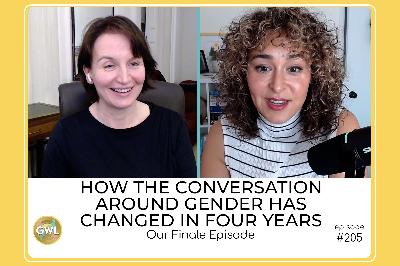
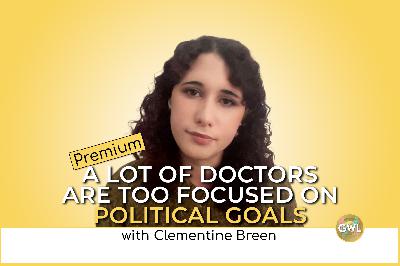

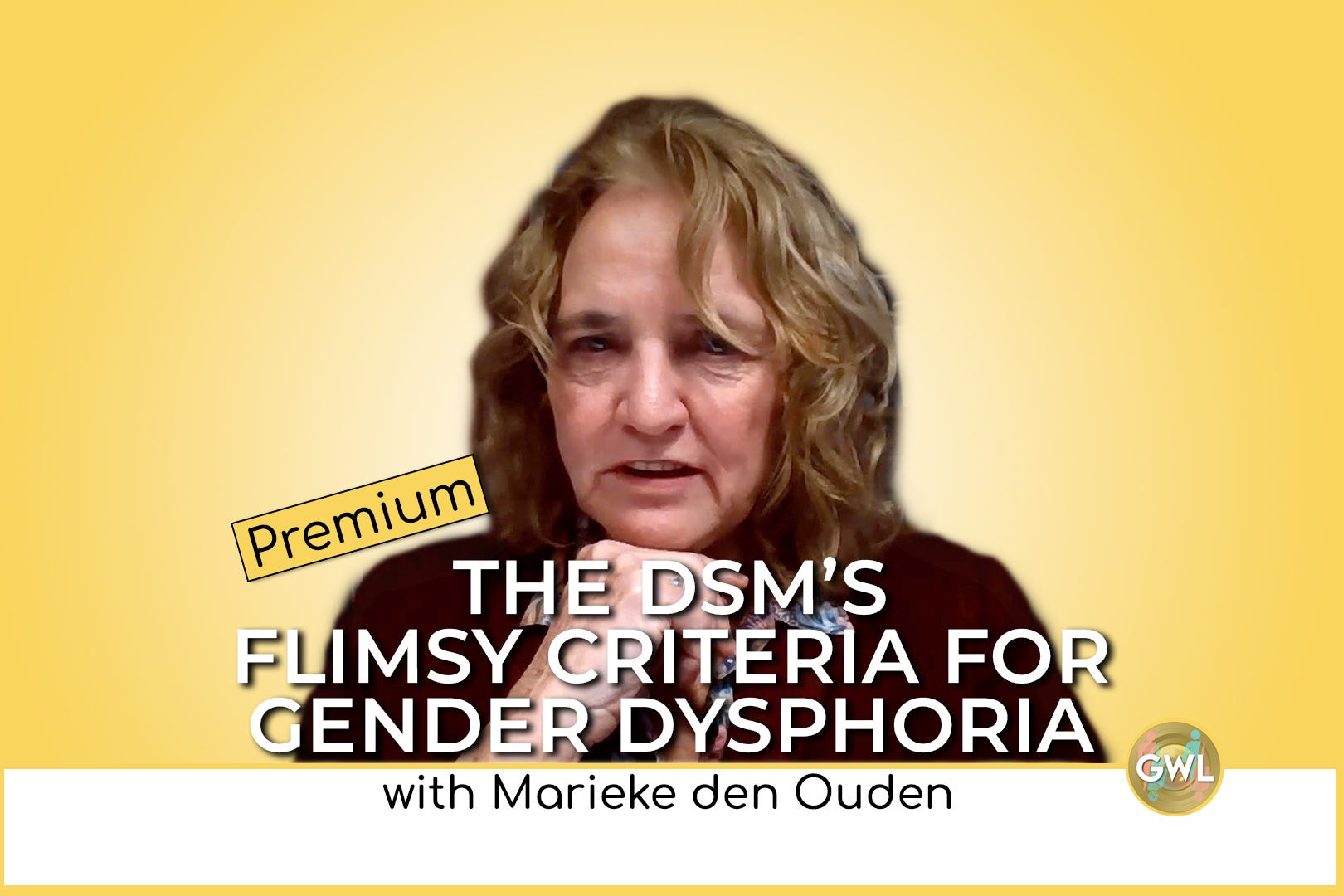
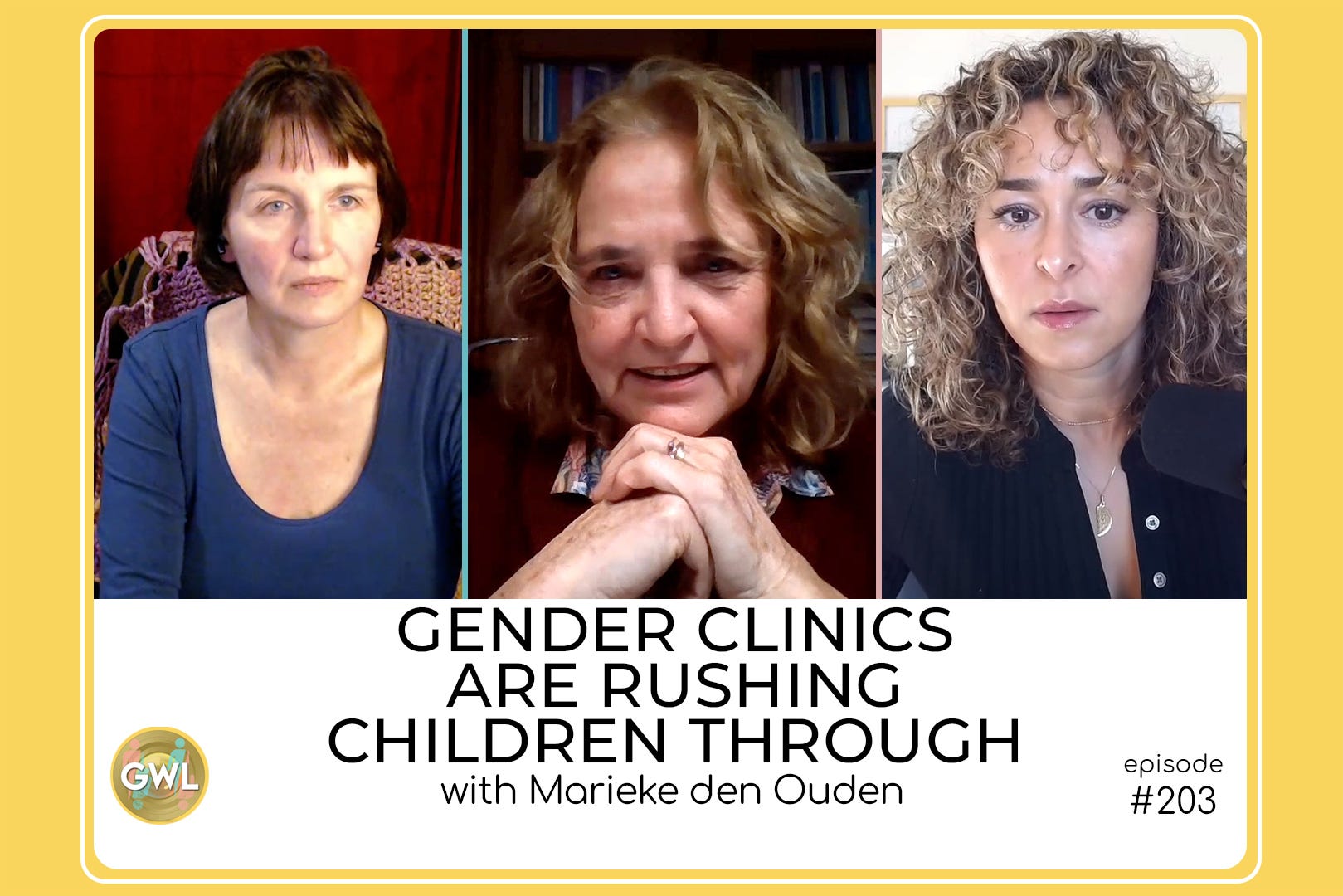
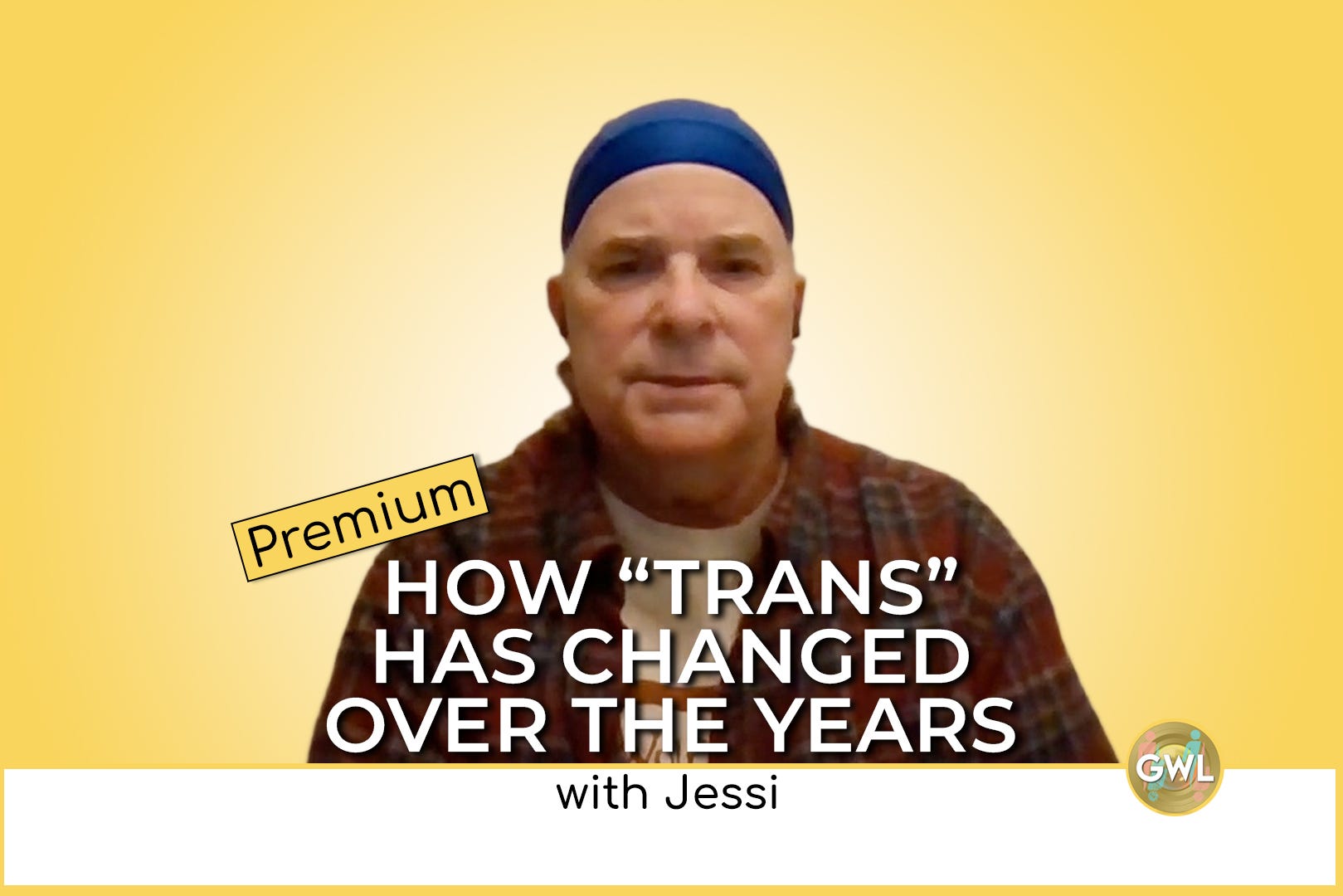











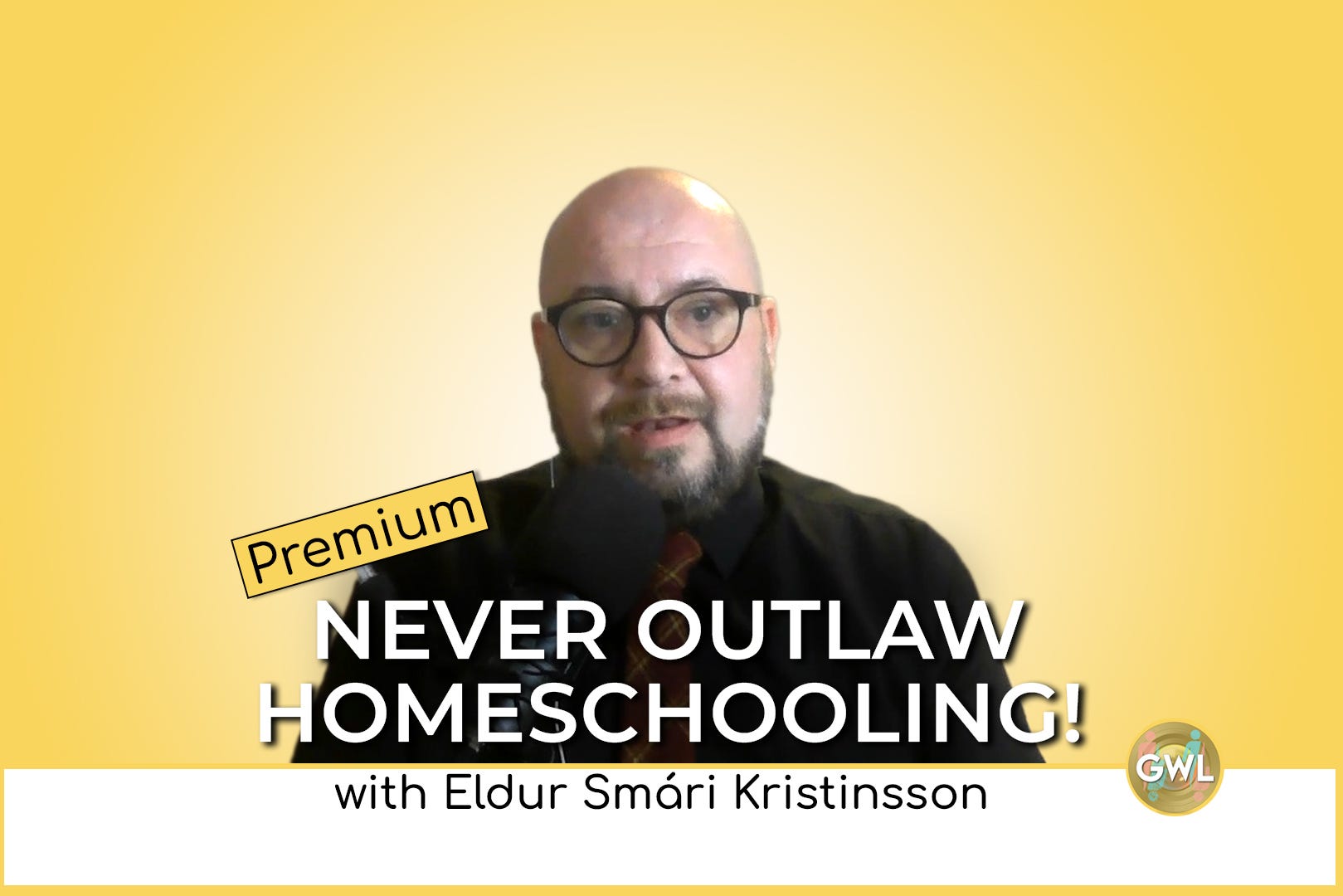
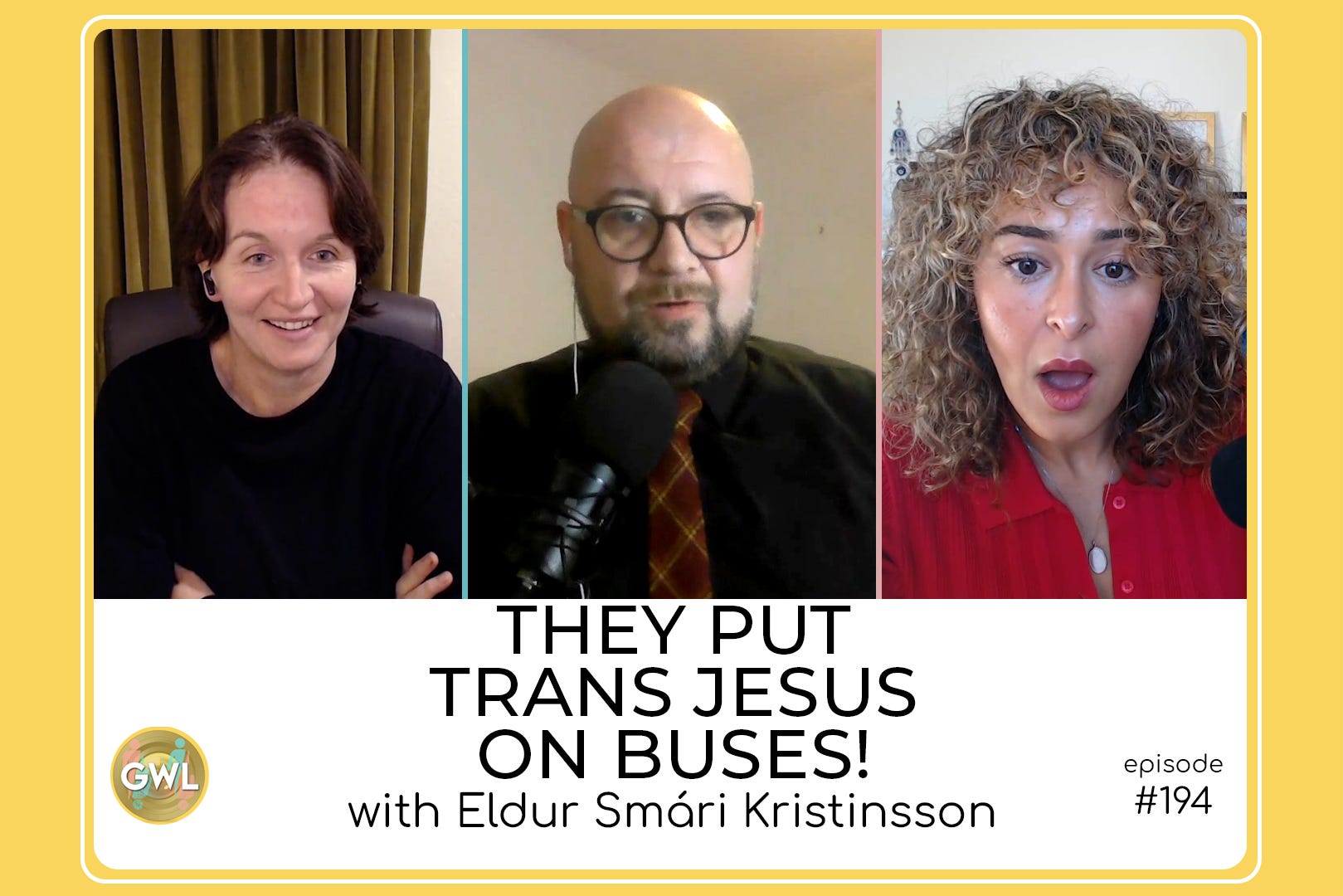



Please can you edit out the first intro to Sacha when you talk over him - was very difficult not to turn this off at that point.
Thanks Stella and Sasha, it was fun to be a part of this conversation...even several laughs throughout. Graham is truly talented, and I look forward to the day I can watch his next comedy.
You talk in this episode about your wish to talk with the German physician Alexander Korte. Did that ever work out? Because I notice an episode with him isn't there. A Dutch physician I know, Hanneke Kouwenberg, who works in Germany herself, also admires him. So it seems to me he's interesting to a lot of people. I would be curious to hearing him!
Great interview, thanks
Great interview, thanks. How can this not boggle the mind of more people?
A podcast masquerading as progressive, while misrepresenting LGBTQIA+ people and their experiences.
We must see a different patient population as his opening generalization about the usefulness of medication is way off base. I think for many with bipolar, schizophrenia and psychotic depression, especially during an acute episode, meds are an essential component in addition to any therapy. If he is referring to personality dysfunction and general discontent then I agree. However, the psychoanalyst approach, though useful in many situations, sometimes seems to make patients dependant, which is unhelpful in my opinion.
Excellent interview, thanks.
I wish Sasha had let him answer Stella's question. It was not satisfactorily answered and thus his position was inconsistent. i.e. it's not the marker of a man yet when men take it they become more aggressive, typical evolutionary male behavior.
A bit naive and perhaps out of touch with recent trends.
Sensible medical practice for a change.
I have so many objections. but I will say their are some alarming revelations such as the speed to which the medical community is now suggestion puberty blockers as the best practices and only option. Also the pressure that society places on everyone to go head first into the social transitioning of very young children seems a little intense. I have heard of the concept of sex permanence as a developmental milestone and can see how this makes what any child under the age of 8says about their gender questionable .. these are definitely concerning. I am not nearly as educated or experienced in this field as the two presenters but they make so many mistakes on the topic like saying that gender nonconforming is the same as gay? and through out the episode they are suggesting that trans kids are that way because of permissive parenting and autism. I don't know it feels wrong. do they believe that trans people even exist? by the end I start to doubt it....
Excellent discussion. I wish more of my colleagues were as honest.
Psychiatry and mental health clinicians have definitely been ideologically captured. The few who are not are too afraid to be honest. Sadly, Dr. Litman will likely be both burned at the stake by her medical colleagues and regulatory bodies in her lifetime and acknowledged as a true clinician and researcher after her demise.
sometimes missed the last bit of Carole's sentence because someone else was jumping in. really interesting. thank u!
laughing at ones sexual identity is not appreciated.
Stella says "I'm a Catholic ...but I don't believe in God or anything". I'm sorry but that's just daft.